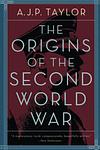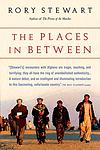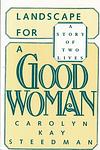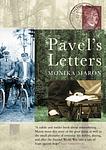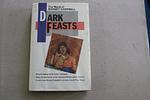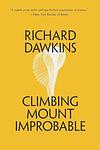The Greatest German, British "Nonfiction" Books Since 1980
Click to learn how this list is calculated.
This list represents a comprehensive and trusted collection of the greatest books. Developed through a specialized algorithm, it brings together 305 'best of' book lists to form a definitive guide to the world's most acclaimed books. For those interested in how these books are chosen, additional details can be found on the rankings page.
Genres
Countries
Date Range
Reading Statistics
Click the button below to see how many of these books you've read!
Download
If you're interested in downloading this list as a CSV file for use in a spreadsheet application, you can easily do so by clicking the button below. Please note that to ensure a manageable file size and faster download, the CSV will include details for only the first 500 books.
Download-
26. Second World War by John Keegan
"Second World War" is a comprehensive account of the global conflict that took place from 1939 to 1945. The book offers a detailed examination of the political, military, and social aspects of the war, from the rise of Hitler and the attack on Pearl Harbor, to the Holocaust and the dropping of the atomic bomb. The author provides an in-depth analysis of the strategies and tactics used by the major powers, and presents a vivid picture of the human cost of the war. The book also includes a variety of maps and photographs to help illustrate the events and locations discussed.
The 3639th Greatest Book of All Time -
27. English Society In The Eighteenth Century by Roy Porter
This book offers a comprehensive exploration of the social landscape of 18th-century England, delving into the diverse aspects of daily life and the remarkable transformations that characterized the era. It examines the intricate fabric of English society, from the lives of the aristocracy to the conditions of the poor, and how the age was shaped by factors such as urbanization, commercialization, and the Enlightenment. The narrative captures the contrasts and contradictions of the period, revealing how advancements in education, culture, and industry coexisted with persistent inequality and social strife, painting a vivid picture of a dynamic and evolving society.
The 3690th Greatest Book of All Time -
28. Nations And Nationalism by Ernest Gellner
This book presents a theoretical exploration of the concept of nationalism, the social conditions fostering it, and its role in the modern world. The author argues that nationalism is a product of industrial society, which necessitates a homogenous culture for communication and a centralized education system to sustain the industrial and economic structure. The work critically examines the origins and implications of nationalism, suggesting that it is not an ancient phenomenon but rather a relatively recent one that arises when a society transitions from agrarian to industrial. The author contends that nationalism serves to align the political and national unit, without necessarily corresponding to pre-existing ethnic or cultural identities, and is a political principle that holds that the political and the national unit should be congruent.
The 4119th Greatest Book of All Time -
29. Revolution in the Head: The Beatles' Records and the Sixties by Ian MacDonald
This book provides a comprehensive analysis of the Beatles' music and its cultural impact during the 1960s. It delves into the creation and significance of each track, examining the technical innovations, lyrical content, and the sociopolitical context of the era. The work offers a song-by-song breakdown, exploring how the band's evolving creative dynamics and the tumultuous decade they helped define were reflected in their recordings. It is both a critical study of the band's discography and a reflection on the revolutionary spirit of the sixties, highlighting how the group's work was intertwined with the broader changes in music, politics, and society.
The 4362nd Greatest Book of All Time -
30. Love's Work by Gillian Rose
"Love's Work" is a deeply personal memoir that explores the life of a renowned philosopher as she grapples with her terminal cancer diagnosis. The book is a profound exploration of love, suffering, and the human condition, as the author reflects on her personal relationships, her career, and her Jewish faith. It is a philosophical and emotional journey that challenges readers to confront their own mortality and the complexities of human life.
The 4374th Greatest Book of All Time -
31. Staying Power: The History of Black People in Britain by Peter Fryer
"Staying Power: The History of Black People in Britain" is a comprehensive account of the African diaspora in Britain from Roman times to the present day. The book explores the various contributions of Black people to the British society, culture, and economy, challenging the traditional narrative that Black presence in Britain began with the Windrush generation. The author delves into the struggles, achievements, and resilience of Black people in Britain, offering a nuanced and detailed historical perspective.
The 4577th Greatest Book of All Time -
32. The Age Of Wonder by Richard Holmes
"The Age of Wonder" explores the scientific and cultural advancements of the late 18th and early 19th centuries, known as the Romantic Age. Richard Holmes delves into the lives and achievements of prominent figures such as Joseph Banks, Humphry Davy, and William Herschel, who revolutionized fields like astronomy, chemistry, and botany. Through vivid storytelling, Holmes captures the spirit of curiosity, imagination, and wonder that defined this era, highlighting the profound impact it had on shaping our modern understanding of science and the world.
The 4604th Greatest Book of All Time -
33. Die Totalitäre Erfahrung by Karl Dietrich Bracher
The book in question provides a comprehensive analysis of totalitarianism, exploring the political and social conditions that give rise to such regimes. It delves into the characteristics of totalitarian states, examining how they gain and maintain power through the manipulation of ideology, the use of terror, and the control of mass communication. The work also reflects on the historical instances of totalitarian governments in the 20th century, offering insights into the dangers they pose to individual freedoms and democratic structures. Through its examination of the dynamics of total control, the book serves as a warning about the fragility of democratic institutions and the constant need to defend them against authoritarian threats.
The 4604th Greatest Book of All Time -
34. The Intellectuals And The Masses by John Carey
This book presents a critical examination of the attitudes of early 20th-century intellectuals towards the masses, exploring the disdain and fear that writers and thinkers of the time harbored against the growing literacy and political empowerment of the working class. The author scrutinizes the elitist views and often eugenic arguments that were used to justify the exclusion of the broader population from cultural and intellectual life. By delving into the works and personal correspondences of prominent figures, the text reveals a landscape of intellectual snobbery and challenges the romantic idealization of literary giants by exposing their contempt for the 'masses' they often deemed inferior.
The 4728th Greatest Book of All Time -
35. The Invisible Woman by Claire Tomalin
The book is a compelling biography that uncovers the life of a woman who played a significant yet largely unrecognized role in literary history. It delves into the hidden narrative of the mistress and muse of a celebrated 19th-century author, exploring the challenges she faced as a woman in Victorian society. Her story, which includes clandestine love affairs, heartbreak, and resilience, is pieced together from scraps of historical evidence, shedding light on her influence on the author's work and revealing the sacrifices she made. The biography is a testament to the untold stories of women who have been overshadowed by the legacies of famous men.
The 4736th Greatest Book of All Time -
36. The Places In Between by Rory Stewart
"The Places In Between" is a memoir by Rory Stewart about his journey on foot across Afghanistan in 2002, shortly after the fall of the Taliban. He travels from Herat to Kabul, encountering a variety of people and landscapes along the way. The book provides a unique insight into the culture and history of Afghanistan, as well as the challenges faced by the country in the aftermath of war. Stewart's writing is both lyrical and informative, making for a compelling read.
The 4781st Greatest Book of All Time -
37. Landscape For A Good Woman by Carolyn Kay Steedman
This book is a poignant exploration of the author's working-class upbringing in post-World War II Britain, intertwining personal memoir with social history. It examines the complex relationship between mothers and daughters, the impact of poverty on women's lives, and the societal expectations placed on women in the mid-twentieth century. Through a blend of historical analysis and autobiographical narrative, the author reflects on her own experiences to challenge traditional narratives about the working class, revealing the emotional and psychological landscape that shapes a woman's identity and aspirations.
The 4787th Greatest Book of All Time -
38. Concerning Computers, Minds, And The Laws Of Physics by Roger Penrose
In this thought-provoking book, a renowned physicist challenges the widely held belief that artificial intelligence can ever truly replicate the complexities of the human mind. Delving into the realms of mathematics, physics, and philosophy, the author argues that consciousness and understanding are fundamentally non-algorithmic processes that cannot be captured by machines. By examining the laws of physics and the nature of computation, he presents a compelling case for the unique qualities of human thought, suggesting that there are aspects of reality and our understanding of it that transcend what can be computed by mechanical means.
The 4827th Greatest Book of All Time -
39. Pavel's Letters by Monika Maron
"Pavel's Letters" is a poignant narrative that explores the personal journey of a novelist who uncovers her family's past in war-torn Poland. After receiving a collection of letters from her grandfather, Pavel, the protagonist delves into the history of her family, their experiences during World War II, and the hardships they faced under Stalin's regime. The book is a compelling blend of personal memories, historical facts, and the exploration of the human spirit's resilience in the face of adversity.
The 4834th Greatest Book of All Time -
40. The Theory Of Communicative Action by Jürgen Habermas
The book is a seminal work in social theory that explores the concept of communicative action, where individuals interact based on mutual understanding and pursue rational arguments, consensus, and cooperation rather than merely acting for individual success. The author critiques the instrumental and strategic action in modern societies and argues that communicative action is essential for maintaining the rationality and democratic nature of human interactions. The work delves into the structures of how language and social interaction form the basis of society and how distortions in communication can lead to social issues, emphasizing the importance of transparent and undistorted communication in achieving genuine understanding and societal cohesion.
The 4842nd Greatest Book of All Time -
41. Nora by Brenda Maddox
This biography provides an in-depth look at the life of the woman who was the muse and wife of one of the 20th century's most influential writers. It explores her unconventional relationship with her husband, her role in his creative process, and how she challenged the norms of her time. The book delves into her personal struggles, her husband's literary fame, and the impact she had on his work, offering a nuanced portrait of a complex and often misunderstood figure who played a crucial role in the shaping of modern literature.
The 4969th Greatest Book of All Time -
42. Reasons And Persons by Derek Parfit
This philosophical work challenges traditional notions of self-interest, rationality, and ethics, arguing that our conventional understanding of these concepts is deeply flawed. The author proposes that the boundaries of personal identity are less clear-cut than we might think, leading to profound implications for moral responsibility and the ethics of future generations. Through rigorous analysis and thought experiments, including the famous "repugnant conclusion," the book pushes readers to reconsider the basis of morality and the ways in which we consider the interests of ourselves and others, ultimately suggesting that reasons and persons are intricately connected in the fabric of ethical reasoning.
The 5075th Greatest Book of All Time -
43. Dark Feasts: The World Of Ramsey Campbell by Ramsey Campbell
"Dark Feasts: The World Of Ramsey Campbell" delves into the eerie and captivating mind of renowned horror author Ramsey Campbell. This book offers a comprehensive exploration of Campbell's unique writing style, his inspirations, and the themes that permeate his works. Through interviews, essays, and analysis, readers are taken on a journey through the dark and unsettling worlds that Campbell has masterfully crafted, revealing the depths of his imagination and the impact he has had on the horror genre.
The 5090th Greatest Book of All Time -
44. A Short History Of Modern Philosophy: From Descartes To Wittgenstein by Roger Scruton
This book provides a concise overview of modern philosophy, tracing its development from the early 17th century to the mid-20th century. It explores the key ideas, debates, and philosophers who have shaped modern thought, starting with René Descartes and progressing through significant figures such as Spinoza, Leibniz, Kant, Hegel, and Wittgenstein. The text examines how these thinkers addressed fundamental questions in metaphysics, epistemology, and ethics, while also considering the historical context that influenced their work. This exploration not only highlights the evolution of philosophical ideas but also illustrates the ongoing dialogue between philosophy and the broader cultural and scientific changes of the modern era.
The 5214th Greatest Book of All Time -
45. Climbing Mount Improbable by Richard Dawkins
In this thought-provoking exploration of evolutionary biology, the book delves into the intricate mechanisms of natural selection that have sculpted the complex, seemingly improbable forms of life on Earth. Using the metaphor of a mountain to represent the vast landscape of evolutionary possibilities, the author guides readers through a series of biological marvels, from the sophisticated optics of the eye to the elaborate structures of spider webs, demonstrating how gradual, step-by-step changes can lead to the astonishing diversity of life. The book illuminates the power of cumulative selection to produce highly adapted organisms and dispels the notion that such complexity requires intelligent design, reinforcing the marvels of evolution as a process of climbing peaks of adaptive fitness in the vast terrain of biological possibility.
The 5303rd Greatest Book of All Time -
46. The Age Of Extremes by Eric Hobsbawm
"The Age of Extremes" is a historical analysis that explores the tumultuous period of the 20th century, spanning from 1914 to 1991. This work delves into the profound transformations and conflicts that defined the era, including the two World Wars, the Cold War, the rise of fascism and communism, and the eventual collapse of the Soviet Union. The book examines the impact of economic crises, technological advancements, and social changes on global societies, offering insights into how these extreme conditions shaped the modern world and its political landscapes. The narrative combines a detailed account of historical events with a critical evaluation of their economic and cultural implications, providing a comprehensive overview of a century marked by both unprecedented progress and devastating turmoil.
The 5310th Greatest Book of All Time -
47. What Sort Of People Should There Be? by Jonathan Glover
The book explores the ethical and philosophical implications of genetic and psychological modifications on human nature. It delves into the potential for these technologies to alter human characteristics such as intelligence, personality, and morality, questioning the moral boundaries and societal impacts of such changes. The author critically examines the responsibilities and decisions facing individuals and society in shaping future generations, while addressing the profound questions about the kind of people humanity should aspire to become in the light of emerging biotechnological capabilities.
The 5390th Greatest Book of All Time -
48. A Year in Provence by Peter Mayle
"A Year in Provence" is a humorous and engaging memoir that chronicles a year in the life of a British couple who move to Provence, France. The book captures the charm and quirks of rural French life, as the couple adapt to their new home, navigate through the French bureaucracy, deal with local tradesmen, and savor the local cuisine and wines. The changing seasons and local customs are vividly described, providing a delightful and insightful view of life in Provence.
The 5484th Greatest Book of All Time -
49. The Anthropic Cosmological Principle by Frank J. Tipler, John D. Barrow
The book explores the Anthropic Cosmological Principle, which posits that the universe's laws, constants, and conditions appear finely tuned to allow for the existence of life, particularly human life. It delves into various scientific disciplines, including cosmology, quantum physics, and biology, to discuss how life influences the universe's structure. The authors examine both weak and strong versions of the principle, discussing philosophical and theological implications, and argue that the universe is uniquely suited for the emergence of intelligent beings who are capable of observing and understanding it. This interdisciplinary approach offers insights into the relationship between complex life and the cosmos's fundamental characteristics.
The 5493rd Greatest Book of All Time -
50. Trillion Year Spree by Brian W. Aldiss
"Trillion Year Spree" is a comprehensive history of science fiction literature, tracing its origins from ancient times through to the modern era. The book explores the evolution of the genre, highlighting key authors, works, and thematic developments. It delves into how science fiction reflects and addresses fundamental human concerns and societal issues, using speculative scenarios to explore possible futures. The narrative also examines the impact of technological advancements on the genre and its increasing popularity and legitimacy as a significant form of literary expression.
The 5495th Greatest Book of All Time
Reading Statistics
Click the button below to see how many of these books you've read!
Download
If you're interested in downloading this list as a CSV file for use in a spreadsheet application, you can easily do so by clicking the button below. Please note that to ensure a manageable file size and faster download, the CSV will include details for only the first 500 books.
Download